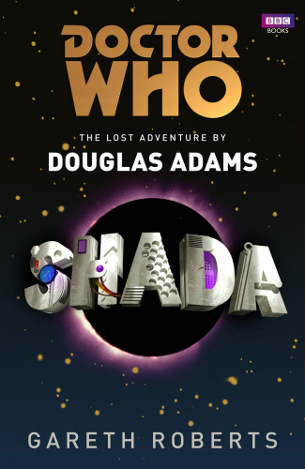Why you can trust GamesRadar+
“Lost” Douglas Adams adventure finally finished
For Doctor Who fans of long standing, Douglas Adams’s “Shada” is something of an itch they can’t scratch. Written during the Hitchhiker’s Guide To The Galaxy creator’s brief tenure as Who ’s script editor, it commenced filming but then fell foul of a strike by BBC technicians during 1979’s Winter Of Discontent, and was never completed. It therefore exists in an exasperating state of canonical limbo.
Numerous attempts have been made to “finish it off” over the years. A 1992 video release edited together the existing footage with linking narration; Big Finish produced a webcast starring Paul McGann’s Doctor in 2003; there’ve also been a couple of fan-written novelisations. This officially-sanctioned adaptation by new series scribe Gareth Roberts attempts to create a definitive version.
Set partly in Cambridge and partly in outer space, the tale sees the megalomaniacal Skagra searching for a book which holds the key to an ancient Gallifreyan secret – a book now in the possession of Professor Chronotis, a scatter-brained retired Time Lord living on Earth as a university don.
Along the way, the evil alien makes use of a sinister sphere which can steal people’s minds to draw upon their knowledge. Lacking such convenient tech, Gareth Roberts has had to rely on various drafts of the scripts to put himself inside Adams's skull, so as to divine his intentions. Knocked out in three days, the script was a rush job, riddled with plotholes which Roberts has “fixed”. Common-sense questions like “Who the hell is this Skagra bloke?”, “How does he know the location of the book?” and “Why doesn’t the Doctor just call in the Time Lords?” have now been satisfactorily answered.
More significantly, Roberts has also fleshed out other aspects of the tale. Picking up on faint hints, he’s transformed the relationship between Chris and Clare, two Cambridge post-grads, into a budding romance. This is threaded throughout, bringing some of the emotional heft of new Who to a story from an age which – contrary to what some deluded revisionists might have you belief – had little or no interest in tugging the audience’s heart-strings.
All this might seem a little presumptuous, given that “Shada” was not, like The Salmon Of Doubt , left unfinished when the author passed away. Adams had 22 years to give it a polish; he just had no interest in doing so, believing it to be an inferior example of his work. Instead, he recycled elements – including the character of Professor Chronotis – for his 1987 novel Dirk Gently's Holistic Detective Agency . How can Roberts possibly know for certain what Adams would have done if he’d chosen to finesse the script himself? Well, he can’t, of course. What matters is that this approach works. This version is an improvement on the one we had.
For those steeped in Who lore, the reading experience has a peculiar dual appeal. On the one hand, there’s the challenge of trying to figure out how it was all pieced together. What was written by Adams? What was improvised in rehearsal? What was added by Roberts? We could happily pore over a heavily-annotated scholarly edition. Sometimes the joins are easy to spot, as when Roberts inserts references to modern-day phenomena from both Who (“fixed points in time” and Neil Gaiman’s unseen Time Lord the Corsair) and the everyday reality of 2012 (sent folders and carbon footprints). But often the transitions are seamless, and it’s impossible to tell where Adams ends and Roberts begins.
Then there’s the pleasure of the story itself, which is a delight to read, largely because Roberts himself is an extremely witty writer. It’s certainly not because he’s performing any kind of cheap impersonation (hardcore Who fans fear not: this isn’t an Eric-Saward’s-novelisation-of-"The Twin Dilemma” scenario). He understands the duo of the Fourth Doctor and Time Lady companion Romana perfectly – their characterisation is spot on – and is equally gifted at making his minor characters come alive. Even a hapless bypasser murdered by Skagra after half a dozen lines of dialogue feels sufficiently tangible for you to mourn his passing. Roberts also has all manner of fun with the possibilities of the medium – for example, giving a TARDIS en-suite a bath that’s eighty feet long .
Is this a “proper novel”, with all the grand associations of weight and significance that phrase carries with it? Well, no, not really – but it is an extremely good novelisation. Is it Douglas Adams at his best? No, but there are plenty of characteristic glimpses of his genius (Skagra’s obsequious spaceship is sure to tickle Hitchhiker’s fans). Is this the definitive version of the story? No. There can never be one of those. Well, not until we recover a recording of the completed story that’s floated through a wormhole from a parallel universe free of industrial action, or clone Douglas from an old toenail clipping and chain him to a writing desk. But it’s certainly the nearest we’re ever likely to get – and it’s an absolute hoot to boot.
Ian Berriman twitter.com/ianberriman
Read our interview with Gareth Roberts about adapting Shada.
Read our roundup of the latest Doctor Who books for kids .
Read our Doctor Who DVD reviews .
Check out our Doctor Who picture puzzle , featuring 65 story titles!
Ian Berriman has been working for SFX – the world's leading sci-fi, fantasy and horror magazine – since March 2002. He's also a regular writer for Electronic Sound. Other publications he's contributed to include Total Film, When Saturday Comes, Retro Pop, Horrorville, and What DVD. A life-long Doctor Who fan, he's also a supporter of Hull City, and live-tweets along to BBC Four's Top Of The Pops repeats from his @TOTPFacts account.



